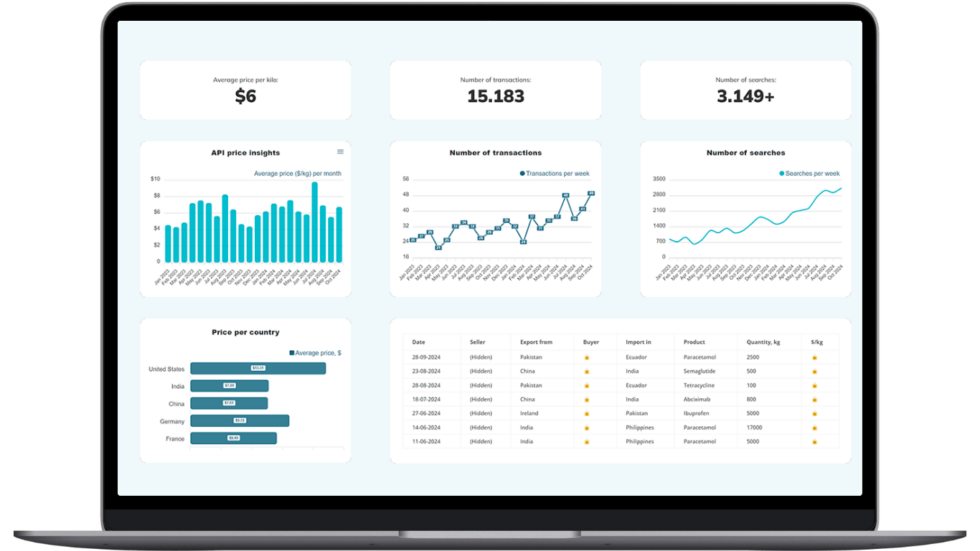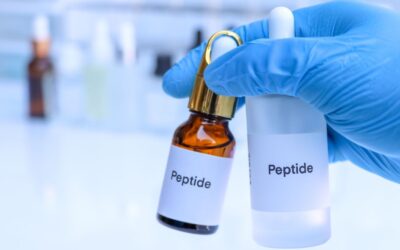What is GMP, FDA, DMF and CEP?
The differences explained

Ammar Badwy | Posted on October 14, 2022 | Updated on October 3, 2023
Introduction
The pharmaceutical industry has some bureaucratic sides, but it’s for a good reason. In the end, most APIs and medicine are intended for taking care of patients.
Keeping that in mind, manufacturers and distributors must live up to certain high standards set by, for example, international agreements, their local government, or other organizations. In this article, we will be handling the main types of certificates or documents as present in the pharmaceutical world.
We made a video about it as well! You decide, watching or reading?
(text continues under the video)

What is GMP? (Good Manufacturing Practices)
GMP stands for Good Manufacturing Practices and is defined as “a system of manufacturing that guarantees reproducibility of product quality to set specifications.” It means being able to output a product with certain specifications consistently and documenting all steps in the process. In GMP tablet manufacturing, this means ensuring that each tablet produced meets consistent quality and safety standards, a cornerstone of the pharmaceutical industry.
If there wasn’t such a system implemented, there would be no way of telling if a certain API or medicine has been produced according to the industry-set quality standards. That’s why the GMP system was introduced and is now the main standard in the pharmaceutical industry worldwide.
For a step-by-step guide on how to apply for a GMP certificate, check out our comprehensive article.
Different kinds of GMP / GMP are also known as:
cGMP: Adapting to Current Standards
- cGMP (current GMP)
Current GMP means that the company complies with the most recent requirements/version of GMP.
WHO GMP: A Global Perspective
- WHO GMP (World Health Organization GMP)
The WHO has its own guideline for GMP. More than 100 countries have incorporated the WHO GMP provisions into their national medicine law, and many more countries have adopted its provisions and approach in defining their own national GMP requirements.
Local, EU, and US GMP: Regional Variations
- Local/EU/US GMP
As with the WHO GMP, It specifies the authority that has audited the company. For example, to know the difference between a Chinese GMP certificate and an EU-GMP certificate, you have to check the difference in GMP requirements of both authorities.
If you are interested in GMP, check out our blog, discussing GMP in detail and the differences between GMP/cGMP.
What is FDA? (Food and Drug Administration)
FDA’s Global Impact
The Food and Drug Administration is a federal agency of the United States Department of Health and Human Services, one of the United States federal executive departments.
FDA is important because it intends to have companies produce their goods to certain standards and presents this fact in a clear overview using FDA certificates. When a company is (US) FDA approved, it shows the American government has declared the API or medicine safe and can be sold, imported, or used in the United States.
For more on how the FDA enforces these regulations, including issuing warning letters, you can read our detailed article on FDA Warning Letters.
The USA is not the only country with a regulatory agency like FDA. Most other countries have agencies responsible for the national safety of pharmaceutical products.
Some different kinds of organizations include:
- EMA (European Medicines Agency, European Union)
- MHRA (Medicines and Healthcare products Regulatory Agency, United Kingdom)
- PMDA (Pharmaceuticals and Medical Devices Agency, Japan)
- CDSCO (Central Drugs Standard Control Organization, India)
What is a DMF? (Drug Master File)
What Does a DMF Include?
A drug master file is a document submitted to governmental bodies that contains all details of the manufacturing process of an API or medicine. This includes information on the chemical properties of the API, the facilities used, the processes used, details on packaging, storage, et cetera. To protect the intellectual property of the manufacturer, this document is confidential.
Types of DMFs Around the World
Countries may have different guidance than other countries, so different types of DMF exist. For example, you may have a US DMF, ASMF (formally known as EDMF), Japanese DMF, Chinese DMF, et cetera.

Make Smarter API Decisions with Data
Access exclusive insights on global API pricing, export/import transactions, competitor activities and market intelligence.
What is ISO?
International Organization for Standardization
ISO is the international organization for standardization. The organization promotes worldwide proprietary, industrial, and commercial standards. Organizations use the standard to demonstrate the ability to consistently provide products and services that meet customer and regulatory requirements. The ISO system pays more attention to the firm’s management and places a number of reporting loops in the firm to ensure attention to issues.
Different kinds of ISO:
- ISO 9001:2015 (a standard that specifies requirements for a quality management system)
- ISO 14001:2015 (a standard that focuses on managing environmental responsibilities)
- ISO 22000:2018 (a sector-specific standard that describes a specific process to develop a food safety management system)
- ISO 45001:2018 (is a new standard published in March 2018 that focuses on occupational health and safety. It is based on- and will be replacing the OHSAS 18001 standard throughout 2018 – 2021)
What is a CoA?
Certificate of Analysis
A CoA is a document issued by a company’s QA/QC-department that confirms that a product meets its product specification and is part of the quality control of a product batch. The CoA commonly contains results obtained from laboratory tests of an individual batch of a product. There are different international standards to which a product can be tested, for example:
- Ph. Eur. | EP – (European Pharmacopoeia)
- USP – (United States Pharmacopeia)
- BP – (British Pharmacopoeia)
- JP – (Japanese Pharmacopoeia)
- ChP – (Chinese Pharmacopoeia, also known as PPRC)
- DAB – (German Pharmacopoeia)
- Ph.Fr. – (French Pharmacopoeia)
- IP – (Indian Pharmacopoeia)
In general, there will be lots of overlap between the different qualities of a certain API. Certain limit values can differ according to the specific values set by different standards. A different monograph can also mean a different way of testing.
A technical data-sheet is not the same as a CoA, as it contains just the general product specifications and does not contain batch-specific results, which the CoA does.
What is an MSDS?
Material Safety Data Sheet
A Material Safety Data Sheet (MSDS) is a product-specific document intended as a reference for the safe use, handling, and processing of the product. It contains information such as identifiers, chemical properties, health hazards, precautionary statements, and other related information for professionals working with the product.
Internationally, there are different requirements for an MSDS, and an MSDS issued in the USA will differ from one issued in China. However, in recent years more and more companies have updated their MSDS to a GHS system(Globally Harmonized System of Classification and Labelling of Chemicals). The GHS is a standard managed by the United Nations (UN) and sets a certain structure for an SDS (16 sections), general statements for health hazards, common symbols, signal words, et cetera.
MSDS is also known as:
- SDS (Safety Data Sheet)
- PSDS (Product Safety Data Sheet)
For a deeper understanding of Safety Data Sheets, see our article on what an SDS is.
What is a CEP?
Certificate of Suitability
A CEP (also known as COS) is a certificate that proves that an API qualifies for the relevant monograph of the European Pharmacopoeia. It links the Ph. Eur. monograph to the API itself. The manufacturer of the API submits a CEP as part of the market authorization process, and they will become the CEP holder of the document.
Being a European certificate, the CEP is granted by the EDQM but is recognized by other countries or institutes, such as the FDA in the US. Furthermore, just like the DMF, the data submitted in the CEP is handled strictly confidential and provides a centralized system recognized by many countries.
Other Certifications: Expanding the Horizons
KOSHER
This certification verifies that the ingredients and the production process comply with kashrut (Jewish dietary law) standards as defined in the Shulchan Aruch, a compilation of Jewish religious law. It is important because it ensures the product is produced within the norms and values of the Jewish religion.
HALAL
The Halal certificate is a document that guarantees that products and services are suitable for the Muslim population. When something is Halal-certified, It meets the requirements of Islamic law and is, therefore, suitable for consumption by the population that practices Islam.
What does BSE/TSE mean?
Bovine spongiform encephalopathy (BSE), commonly known as mad cow disease, is a neurodegenerative disease of cattle. Transmissible Spongiform Encephalopathies (TSE), also known as prion diseases, are a family of diseases occurring in humans and animals and are characterized by a degeneration of brain tissue, giving a sponge-like appearance leading to death.
This certificate declares that the product is free from animal-derived materials, including bovine products.
What does GMO mean?
Genetically Modified Organisms
Genetically Modified Organisms (GMO) are living organisms, and their genetic material has been artificially manipulated in a laboratory through genetic engineering. This creates combinations of plant-, animal-, bacteria-, and virus genes that do not occur in nature or through traditional breeding methods. Livestock and crops are the most common GMOs today; for example, livestock will be bred to develop muscle or fat, and crops will grow larger and faster.
Pharmaceutical and chemical companies that manufacture Non-GMO raw materials must have a statement ensuring the validity of all Non-GMO raw materials.
What is a WC?
Written Confirmation
When an API is imported into the European Union from elsewhere, it should be accompanied by a “written confirmation” (WC). A written confirmation is a document the country’s health authorities set up where the API was manufactured. After inspections were successfully performed under EU/GMP equivalent standards, the health authorities can provide a WC. These inspections will also have to take place in the future regularly.
Written Confirmations for API imports are not necessary when countries outside the EU are included in an official list of countries equivalent to the EU regarding GMP standards, inspections, and sanctions. So, countries on this list are exempt from needing a WC.
Japan, the United States, Brazil, Australia, Israel, Switzerland, and South Korea are the countries that have currently been granted exemption from a Written Confirmation, and there are a couple more countries that have applied. The list of these countries can be found on the website of the European Commission.
What is GDP?
Good Distribution Practice
GDP is a quality system for warehouses and distribution centers dedicated to pharmaceutical products. It focuses on the distribution of APIs and medicines. It controls the whole process, from the moment a product leaves the manufacturer to the point where it reaches the end-user. For example, GDP checks if all documentation is present and the goods are correctly stored. With storage, the temperature must be controlled and logged into a system.
In conclusion:
These are just a few of the certificates in the pharmaceutical industry, but they are the ones we found most relevant and are listed on the product pages here on Pharmaoffer.
FAQ
What is GMP?
Good Manufacturing Practices (GMP) is a set of guidelines ensuring the consistent and high-quality production of pharmaceutical products. GMP compliance is crucial for gaining consumer trust and is universally recognized in the pharmaceutical industry.
What are the Types of GMP?
- cGMP (current GMP): Refers to the latest requirements or version of GMP.
- WHO GMP: Guidelines set by the World Health Organization.
- Local/EU/US GMP: Varies depending on the auditing authority.
What is FDA?
The Food and Drug Administration (FDA) is a U.S. federal agency responsible for the regulation and safety of food and pharmaceuticals. FDA approval is a significant indicator of a product's safety and efficacy.
Are there alternatives to FDA in other countries?
Yes, each country has its own regulatory body, such as:
- EMA in the European Union
- MHRA in the United Kingdom
- PMDA in Japan
What is DMF?
Drug Master File (DMF) is a confidential document detailing an API or medicine's manufacturing process. It's essential for regulatory compliance and varies by country (e.g., US DMF, Japanese DMF).
What is ISO?
ISO (International Organization for Standardization) sets global standards for quality management. Popular types include ISO 9001:2015 (Quality Management), ISO 14001:2015 (Environmental Management), and ISO 45001:2018 (Occupational Health and Safety).
What is a CoA?
Certificate of Analysis (CoA) confirms that a product meets its specification. It is generated by the QA/QC department and often tests according to international standards like Ph. Eur. or USP.
What is MSDS?
Material Safety Data Sheet (MSDS) is a document outlining the safe usage, handling, and hazards related to a product. MSDS exists in different forms internationally, often updated to a GHS system.
What is a CEP?
Certificate of Suitability (CEP) is a European certificate proving that an API is compliant with European Pharmacopoeia monographs. It's often recognized globally.
What are KOSHER and HALAL Certificates?
KOSHER and HALAL certificates confirm compliance with Jewish and Islamic dietary laws, respectively.
What does BSE/TSE mean?
These certify that a product is free from materials derived from cattle or any animal prone to specific neurodegenerative diseases.
What is a WC in Pharma?
Written Confirmation (WC) is a document needed when importing APIs into the EU. Certain countries are exempt from needing a WC based on mutual agreements.
What is GDP?
Good Distribution Practice (GDP) ensures the quality of a product from manufacturing to the end-user, including aspects like documentation and storage conditions.
I have written this blog to the best of my knowledge and belief. I’m not a pharmacist and don’t bear the responsibility for any errors or mistakes.






Check out all other blogs here!